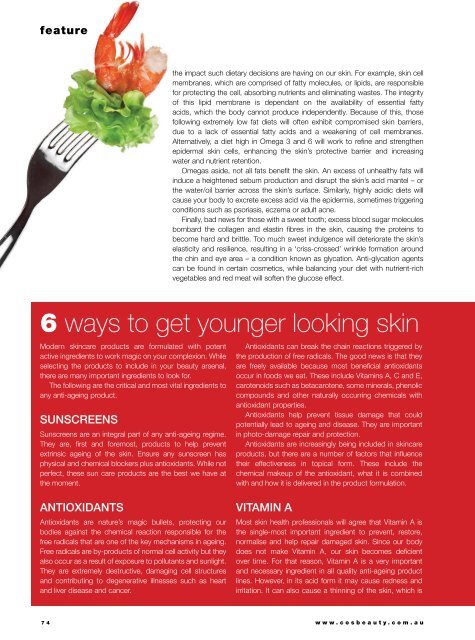Cosmetic Surgery and Beauty Magazine #66
Cosmetic Surgery and Beauty is the must-read for anyone considering a cosmetic procedure or treatment. With hundreds of before and after photo, and cosmetic and plastic surgery experts featured, tis educational resource will allow you to confidently decide the best course of action. This issue includes features on: Breast reshaping Six ways to get younger looking skin Surgical vs non-surgical fat reduction Body soothing products Energy boosters DIY perfect makeup As well as regular features on breast augmentation, facelifting, rhinoplasty and liposculpture/liposuction.
Cosmetic Surgery and Beauty is the must-read for anyone considering a cosmetic procedure or treatment. With hundreds of before and after photo, and cosmetic and plastic surgery experts featured, tis educational resource will allow you to confidently decide the best course of action.
This issue includes features on:
Breast reshaping
Six ways to get younger looking skin
Surgical vs non-surgical fat reduction
Body soothing products
Energy boosters
DIY perfect makeup
As well as regular features on breast augmentation, facelifting, rhinoplasty and liposculpture/liposuction.
You also want an ePaper? Increase the reach of your titles
YUMPU automatically turns print PDFs into web optimized ePapers that Google loves.
feature<br />
the impact such dietary decisions are having on our skin. For example, skin cell<br />
membranes, which are comprised of fatty molecules, or lipids, are responsible<br />
for protecting the cell, absorbing nutrients <strong>and</strong> eliminating wastes. The integrity<br />
of this lipid membrane is dependant on the availability of essential fatty<br />
acids, which the body cannot produce independently. Because of this, those<br />
following extremely low fat diets will often exhibit compromised skin barriers,<br />
due to a lack of essential fatty acids <strong>and</strong> a weakening of cell membranes.<br />
Alternatively, a diet high in Omega 3 <strong>and</strong> 6 will work to refine <strong>and</strong> strengthen<br />
epidermal skin cells, enhancing the skin’s protective barrier <strong>and</strong> increasing<br />
water <strong>and</strong> nutrient retention.<br />
Omegas aside, not all fats benefit the skin. An excess of unhealthy fats will<br />
induce a heightened sebum production <strong>and</strong> disrupt the skin’s acid mantel – or<br />
the water/oil barrier across the skin’s surface. Similarly, highly acidic diets will<br />
cause your body to excrete excess acid via the epidermis, sometimes triggering<br />
conditions such as psoriasis, eczema or adult acne.<br />
Finally, bad news for those with a sweet tooth; excess blood sugar molecules<br />
bombard the collagen <strong>and</strong> elastin fibres in the skin, causing the proteins to<br />
become hard <strong>and</strong> brittle. Too much sweet indulgence will deteriorate the skin’s<br />
elasticity <strong>and</strong> resilience, resulting in a ‘criss-crossed’ wrinkle formation around<br />
the chin <strong>and</strong> eye area – a condition known as glycation. Anti-glycation agents<br />
can be found in certain cosmetics, while balancing your diet with nutrient-rich<br />
vegetables <strong>and</strong> red meat will soften the glucose effect.<br />
6 ways to get younger looking skin<br />
Modern skincare products are formulated with potent<br />
active ingredients to work magic on your complexion. While<br />
selecting the products to include in your beauty arsenal,<br />
there are many important ingredients to look for.<br />
The following are the critical <strong>and</strong> most vital ingredients to<br />
any anti-ageing product.<br />
Sunscreens<br />
Sunscreens are an integral part of any anti-ageing regime.<br />
They are, first <strong>and</strong> foremost, products to help prevent<br />
extrinsic ageing of the skin. Ensure any sunscreen has<br />
physical <strong>and</strong> chemical blockers plus antioxidants. While not<br />
perfect, these sun care products are the best we have at<br />
the moment.<br />
Antioxidants can break the chain reactions triggered by<br />
the production of free radicals. The good news is that they<br />
are freely available because most beneficial antioxidants<br />
occur in foods we eat. These include Vitamins A, C <strong>and</strong> E,<br />
carotenoids such as betacarotene, some minerals, phenolic<br />
compounds <strong>and</strong> other naturally occurring chemicals with<br />
antioxidant properties.<br />
Antioxidants help prevent tissue damage that could<br />
potentially lead to ageing <strong>and</strong> disease. They are important<br />
in photo-damage repair <strong>and</strong> protection.<br />
Antioxidants are increasingly being included in skincare<br />
products, but there are a number of factors that influence<br />
their effectiveness in topical form. These include the<br />
chemical makeup of the antioxidant, what it is combined<br />
with <strong>and</strong> how it is delivered in the product formulation.<br />
Antioxidants<br />
Antioxidants are nature’s magic bullets, protecting our<br />
bodies against the chemical reaction responsible for the<br />
free radicals that are one of the key mechanisms in ageing.<br />
Free radicals are by-products of normal cell activity but they<br />
also occur as a result of exposure to pollutants <strong>and</strong> sunlight.<br />
They are extremely destructive, damaging cell structures<br />
<strong>and</strong> contributing to degenerative illnesses such as heart<br />
<strong>and</strong> liver disease <strong>and</strong> cancer.<br />
Vitamin A<br />
Most skin health professionals will agree that Vitamin A is<br />
the single-most important ingredient to prevent, restore,<br />
normalise <strong>and</strong> help repair damaged skin. Since our body<br />
does not make Vitamin A, our skin becomes deficient<br />
over time. For that reason, Vitamin A is a very important<br />
<strong>and</strong> necessary ingredient in all quality anti-ageing product<br />
lines. However, in its acid form it may cause redness <strong>and</strong><br />
irritation. It can also cause a thinning of the skin, which is<br />
74 www.cosbeauty.com.au

















